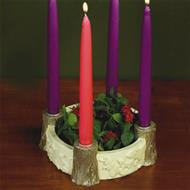When
the Church celebrates the liturgy of
Advent each year, she makes present this ancient expectancy of the Messiah,
for by sharing in the long preparation for the Savior’s first coming, the
faithful renew their ardent desire for his second coming. By celebrating the
precursor’s birth and martyrdom, the Church unites herself to his desire: “He must
increase, but I must decrease.”
—Catechism of the Catholic Church, 524; see Revelation 22:17; John
3:30
The Church year begins with the
first Sunday of Advent. During this four-week season, we wait in great
expectation to celebrate the birth of Jesus and look forward to his second
coming. The Advent wreath is a popular sacramental that feeds our devotion to the
Lord during this season.
As with many of the older customs of
the Church, not much is known about the history of the Advent wreath. Most
people agree that a wreath similar to what we use today originated in the
sixteenth century in Germany, among the Lutherans. The tradition was brought to
America with the German immigrants and became popular in the Catholic faith
around the 1920s.
The Advent wreath is a symbol of the
Light overcoming spiritual darkness. As the laurel wreath was symbolic of
victory, so the wreath of evergreens represents the One who is to come and win
over death. The circular shape represents the eternity he secures for us. Many
people use holly in their wreaths to signify the crown of thorns, the red
berries reminding us of the blood that Jesus shed for our salvation.
The three purple candles in the
wreath symbolize preparation, penance, and sacrifice. We light the one pink
candle on the third Sunday of Advent, called Gaudete Sunday, meaning “rejoice.” The Entrance Antiphon for this
day is “Rejoice in the Lord always; again I say, rejoice! The Lord is near” (Philippians 4:4–5).
Some people include a white candle
in the center of the wreath. This is the Christ candle, to be lit on Christmas
Day. The purple and pink candles can be replaced with all white candles and can
continue to be lit throughout the Christmas season . The gradual increase of light
throughout the Advent season illuminates into Light for the World, our Lord and
Savior Jesus Christ.
The Advent wreath in the home calls
up many different traditions. Whether we make one from a Styrofoam ring or buy
one that matches our other Christmas decorations, the wreath is meant to bring
us to prayer, to lead us to the Light, and to renew our desire for him in our
daily lives. Families seem to develop their own ways of gathering together
during this hectic time of year, to read and to pray and to light candles. This
sacramental reminds us to slow down, to remember why we give one another gifts,
to think about whom we are celebrating.
Another favorite family sacramental
during the Advent season is the Advent calendar. Also originating in Germany,
the cardboard calendars generally have a Christmas scene on the front, with
twenty-five cut-out doors that can be opened, one each day from December 1
until Christmas Day. Each door reveals a scene or a Scripture verse or both
that lead us through the season to the birth of Jesus.

No comments:
Post a Comment